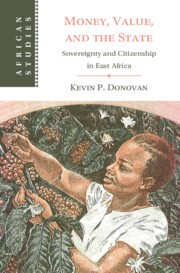Book contents
- Money, Value, and the State
- African Studies Series
- Money, Value, and the State
- Copyright page
- Dedication
- Contents
- Figures
- Acknowledgments
- A Note on the Text
- Introduction
- 1 The Moneychanger State
- 2 A Monopoly on Valuation
- 3 Restricted Value
- 4 Crimes against Economy
- 5 Magendo
- Conclusion
- Archival Collections Consulted
- Bibliography
- Index
- African Studies Series
5 - Magendo
Arbitrage and Ambiguity on an East African Frontier
Published online by Cambridge University Press: 05 December 2024
- Money, Value, and the State
- African Studies Series
- Money, Value, and the State
- Copyright page
- Dedication
- Contents
- Figures
- Acknowledgments
- A Note on the Text
- Introduction
- 1 The Moneychanger State
- 2 A Monopoly on Valuation
- 3 Restricted Value
- 4 Crimes against Economy
- 5 Magendo
- Conclusion
- Archival Collections Consulted
- Bibliography
- Index
- African Studies Series
Summary
This chapter reconstructs the ethical ambiguities and popular anxieties that emerged during a spectacular period of coffee smuggling in the 1970s, centered in Chepkube village near the border of Kenya and Uganda. The criminalized trade provided residents with newfound wealth and consumptive possibility; magendo, as it was known, also was a stark challenge to the Ugandan state’s ability to monopolize the valuation of its most important export. However, participants’ unease did not reflect the illegality of magendo. Rather, the excessive and rapid riches acquired through coffee smuggling challenged prevailing ideas of propriety, respectability, and morality. In other words, existing ideas about how proper value should be morally produced—through laborious effort and familial networks—were undermined by the sudden revaluation of coffee. Smuggling is a form of arbitrage, a style of economic action premised on the capitalization on disjunctures of jurisdiction, of measurement, and of appearance. Magendo participants actively worked to produce such differences in order to acquire wealth; yet arbitrage generated an ambiguous mix of desire and disdain. Based on oral histories and fieldwork on both sides of the border, this chapter reveals how the careful orchestration of social relations and material goods is at the heart of valuation, and it emphasizes how popular valuation practices change and conflict with state projects of governing value and defining citizenship.
Keywords
- Type
- Chapter
- Information
- Money, Value, and the StateSovereignty and Citizenship in East Africa, pp. 263 - 303Publisher: Cambridge University PressPrint publication year: 2024

